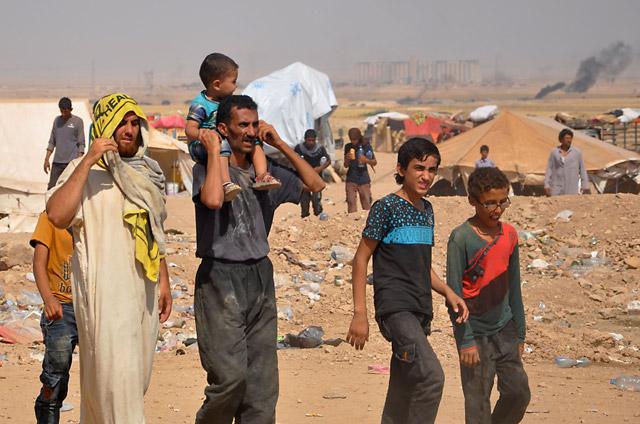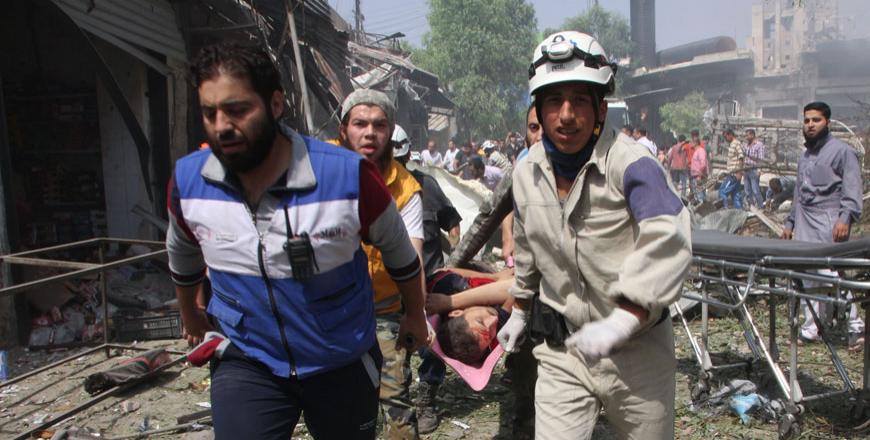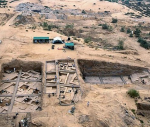You are here
In east Syria, civilians flee Daesh, and deadly air strikes
By AFP - Sep 26,2017 - Last updated at Sep 26,2017
NEAR DEIR EZZOR, Syria — The line extends to the horizon, as hundreds of men, women and children flee into Syria's desert in eastern Deir Ezzor, escaping the Daesh terror group, but also deadly air strikes.
Two separate military offensives against the jihadist group are ongoing in the oil-rich province, which sits on Syria's eastern border with Iraq.
The first is being waged by the Syrian army, with Russia support, on the western bank of the Euphrates river that slices diagonally across the province.
A second is being fought by the Syrian Democratic Forces, an alliance of Kurdish and Arab fighters backed by the US-led coalition.
Air strikes from both campaigns have reportedly killed dozens of civilians, and unleashed a new wave of displacement in a country where over the half the population has already been forced from their homes.
"We've been walking for two days. We left everything behind to leave and seek safety, far away from the fighting and bombing," says Um Mohamed, from a small village in the northeast of the province.
From her home, she faces a route of some 80 kilometres to reach a camp for the displaced in a neighbouring province.
"We have neither food nor water. All we want is to reach the camps," the 54-year-old says, a red headscarf wrapped around her wrinkled face and a string of children pressing at her sides.
'Everything you can imagine'
The women walk forward dressed in black robes known as abayas, carrying their infants in their arms.
Larger children sit on the shoulders of their fathers, some of whom also carrying bundles and travel bags of the few possessions they have been able to bring.
"People are leaving because they are sick, they're afraid of being forcibly conscripted by Daesh," said Khalif.
"They prefer to flee" than fight alongside the extremists, said the 33-year-old, who fled the Daesh-held border town of Albu Kamal.
His head wrapped in a scarf to protect against the intense sun, he said his town was coming under "intense bombardment".
"Daesh is present in the city, and they are being bombed, but there are also civilian casualties."
Fatigue is etched on the faces of the fleeing, and many have abandoned things along the way to lighten their loads, strewing the desert with water bottles, clothes and blankets.
Those with the money to pay for a spot crowd onto pick-up trucks or minibuses, but the less fortunate can rely only on their own two feet.
"The situation is incredibly bad," says Saddam Al Mohamed.
"There's fighting, bombing, hunger, siege and conscription. Everything you can imagine you can see there.
"The more fighting there is, the more people leave," adds the 37-year-old, from a town in the northern part of the province.
"The road is hard, we've been walking for two days."
'People fear
for their children'
A water-truck on the route gives the parched civilians a chance to refill their bottles and wash the veil of dust from their faces.
Having no more strength left to walk, a child is allowed by his father to drag through the dirt.
His mother, already carrying a newborn in one arm, uses the other to scoop him up.
The displaced are heading for neighbouring provinces of Raqqa and Hasakeh, areas held by Kurdish forces where camps have been set up to host tens of thousands fleeing Daesh and the campaigns being fought against the extremists.
In the desert village of Abu Faas, in southern Hasakeh, Kurdish security forces gather arrivals at a processing centre.
"We gather the civilians here for a few hours as a security measure, to search them for fear of Daesh fighters sneaking in among the civilians," a security official says speaking on condition of anonymity.
Abu Khaled is among the luckier escapees, and is driving his wife and their gaggle of children to safety in a small truck.
"People are fleeing because of the war, and the planes that bomb the civilians. People fear for their children," he says behind the wheel of the vehicle, sporting a salt-and-pepper beard.
White chest hair peeks from the neck of his short-sleeved robe, while his wife sitting next to him is enveloped in a black face veil.
"He who has no one can count only on God," he says.
Related Articles
ARISHA, Syria — The Daesh group order that prompted Mahmud Al Ali to flee his town was simple: "All young men aged 20 to 30 years old must e
BEIRUT — Kurdish forces drove Daesh fighters from the flashpoint Syrian border town of Kobani on Saturday, after a killing spree by the mili
BEIRUT — At least 37 people were killed in government barrel bomb attacks in northern Syria on Wednesday, a monitoring group said, while in

















